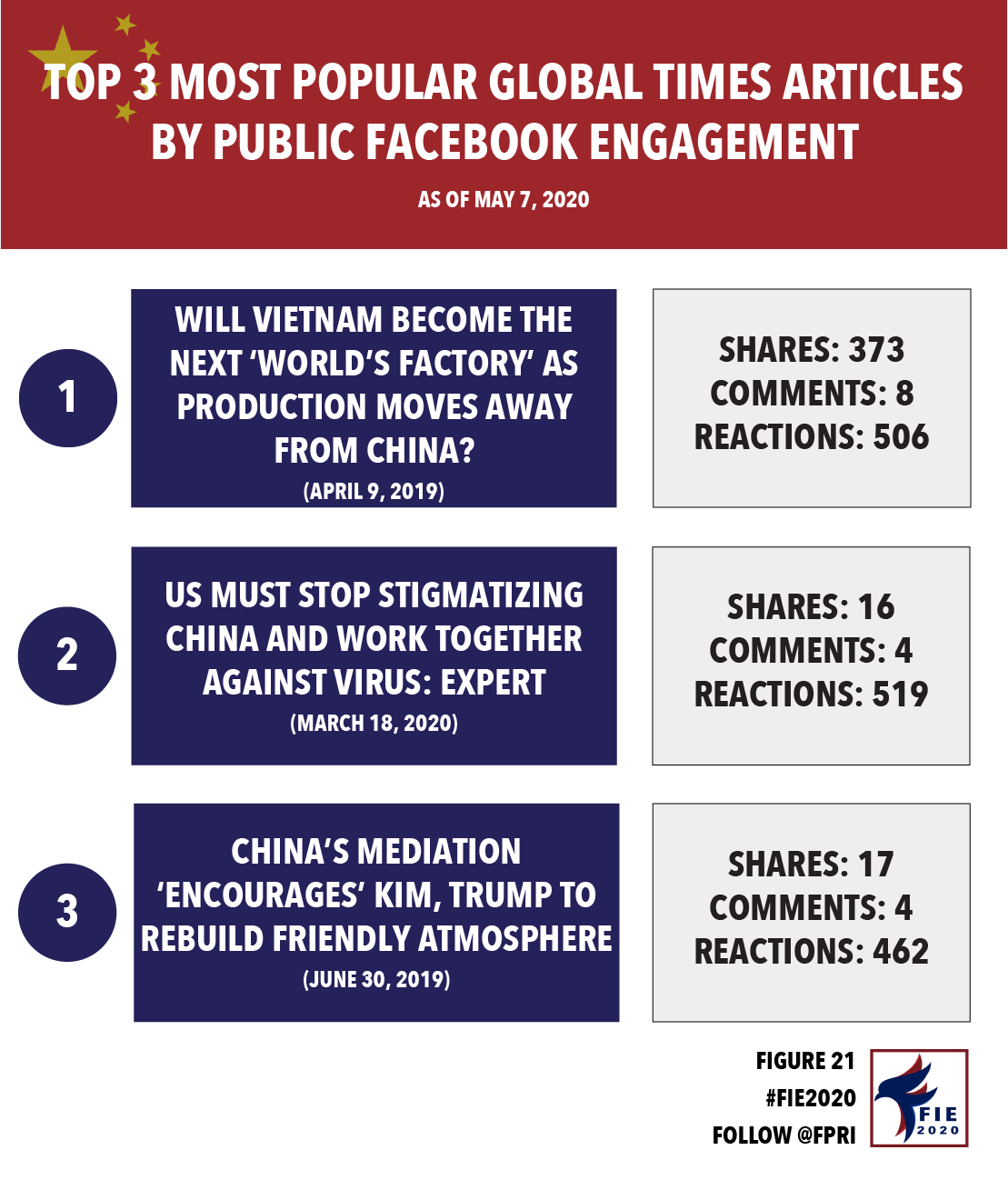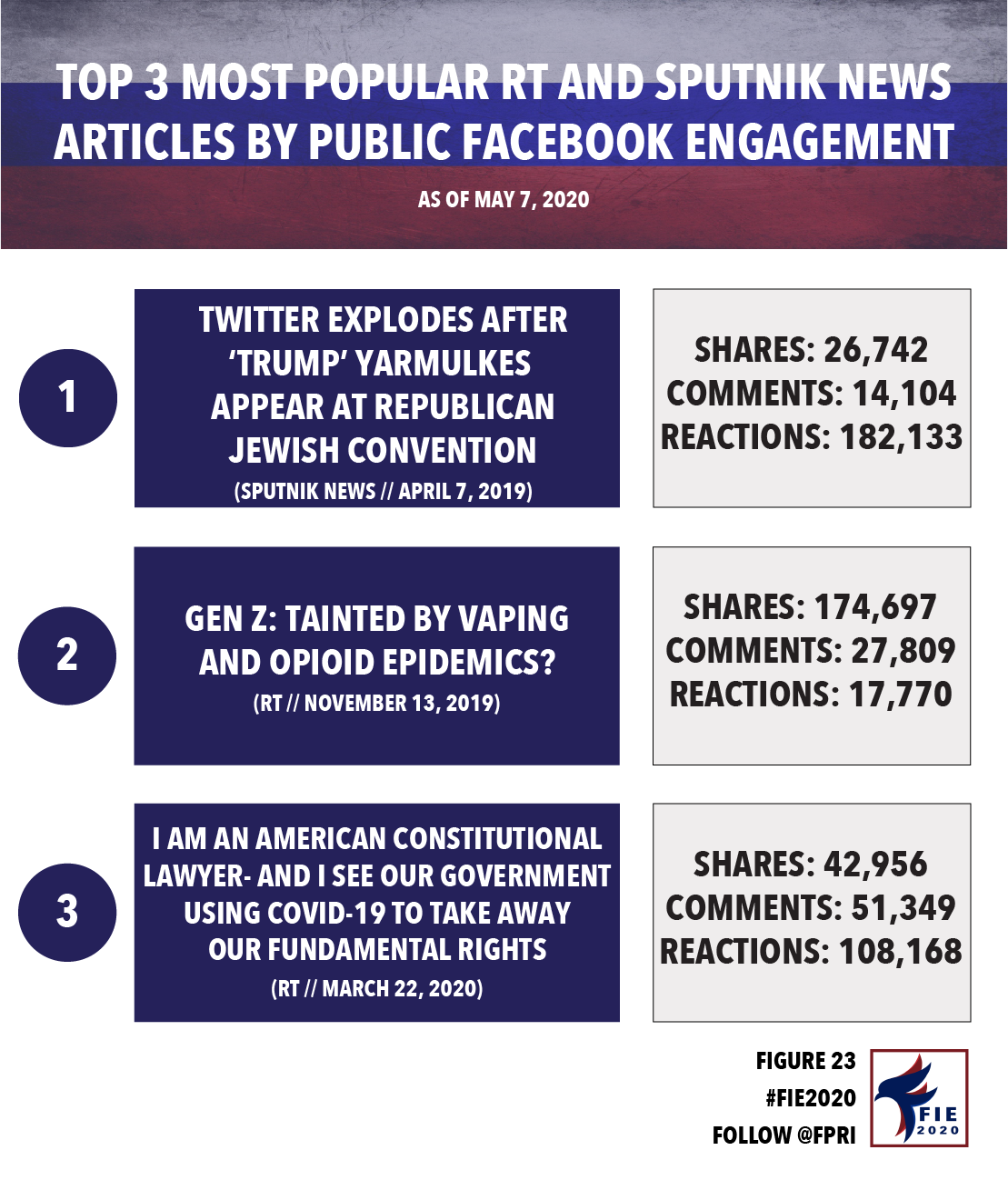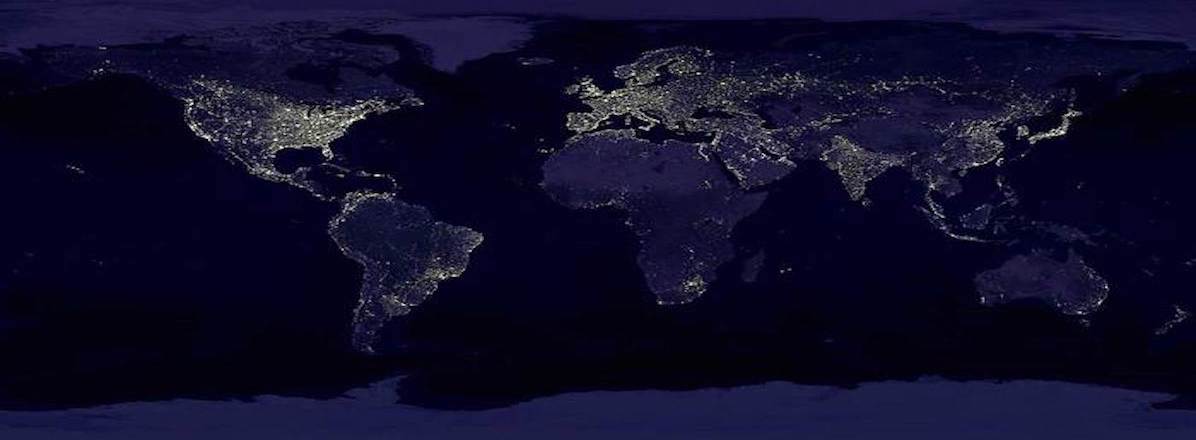A nation must think before it acts.
Chinese, Iranian and Russian State-Sponsored News: Which Stories Spread the Most?
May 12, 2020
Post by Cyrena Kokolis
FIE 2020 recently evaluated the social media presence and reach of Russian, Iranian and Chinese state-sponsored news outlets. But which of the outlets’ articles gain the most traction on social media platforms, and how do the overarching narratives contained in such articles differ from country to country? To answer this question, FIE 2020 analyzed more than 15,500 catalogued articles, published from January 1, 2019 to April 21, 2020, for public Facebook engagement. (The articles were catalogued based on explicit mentions of the 2020 election, 2020 candidates or a relevant political issue, like COVID-19 or American tech companies. See FIE 2020’s project methodology here.)
Among China’s Global Times articles, economics is a dominant theme, with the singular most popular subject of economic stories is the U.S.-China trade war. Four of the ten Chinese articles with the most public Facebook engagement overall (measured in public Facebook shares, comments and reactions) pertain to the trade war, including the most popular article, a Global Times story asserting that the Vietnamese economy has reaped significant benefits at China’s expense in the dispute. Another trend among the most popular Global Times stories on Facebook is coverage of U.S.-North Korea relations, with three of the ten most popular articles covering the issue. See the chart below for the top three Global Times articles based on public Facebook engagement as of May 7, 2020, titled “Will Vietnam Become the Next ‘World’s Factory’ as Production Moves Away from China?,” “US Must Stop Stigmatizing China and Work Together Against Virus: Expert,” and “China’s Mediation ‘Encourages’ Kim, Trump to Rebuild Friendly Atmosphere.”

Most popular PressTV articles deal with political rather than economic matters, with stories on international politics comprising the largest portion of those shared most often. Seven of the ten PressTV articles with the most public Facebook engagement pertain to foreign policy, and most of these articles characterize the United States as unduly exercising its influence abroad to serve its own national interest. The PressTV article with the most Facebook engagement, with nearly 14,000 shares as of May 7, centers around Britain’s Prince Harry calling President Trump “one of the ‘sick people’ running the world.” Other popular stories have headlines such as “US biological warfare against China could lead to World War III” (more than 1,400 shares as of May 7) and “US torpedoed the entire global economy to stop China’s rise” (more than 2,100 shares as of May 7). In short, the Iranian articles that gain the most public traction on Facebook are those that construct a cohesive narrative about the detriments of U.S. leadership. See the chart below for the top three PressTV articles based on public Facebook engagement as of May 7, titled “UK Prince Harry Says Trump is One of the ‘Sick People’ Running the World,” “US torpedoed the entire global economy to stop China’s rise,” and “Bin Salman Ready to Recognize Israel if US Helps him Defeat Iran: Documentary.”

The common thread connecting the most popular RT and Sputnik News stories is more related to tone than content: Russia’s stories seeing the most public Facebook engagement are those that appear to offer alternative takes on mainstream news stories, regardless of subject matter. Popular pieces from Russian outlets often feature snarky headlines and sensationalist language, increasing their potential for virality online. Recently, articles using sensationalist or conspiratorial rhetoric concerning the COVID-19 crisis have been gaining popularity. For example, an RT article titled “Coronavirus may be a product of US ‘biological attack’ aimed at Iran & China, IRGC chief claims” received nearly 21,000 shares as of May 7. Another story, titled “Run for the hills! Pentagon sends teams into MOUNTAIN BUNKERS as pandemic preparations go into full swing” received more than 12,000 shares as of May 7. One RT op-ed, titled “I am an American Constitutional Lawyer—and I See Our Government Using COVID-19 to Take Away Our Fundamental Rights,” opens with a rhetorical question: “Could we quarantine the constitution?” The article was shared more than 40,000 times as of May 7.
These RT and Sputnik News articles are reflective of the broader tone of the Russian articles that often see far reach: one of skeptical derision toward the U.S.’s “establishment” politicians and media outlets and attempting to instill fear via calamitous messaging. See the chart below for the top three RT and Sputnik News articles based on public Facebook engagement as of May 7, titled “Twitter Explodes After ‘Trump’ Yarmulkes Appear at Republican Jewish Convention,” “Gen Z: Tainted by Vaping and Opioid Epidemics?,” and “I am an American Constitutional Lawyer—and I See Our Government Using COVID-19 to Take Away Our Fundamental Rights.”

Ultimately, the most popular articles from each country’s state media outlets accurately reflect the general sentiment of each country’s collective attitude towards the United States. Chinese media presents the U.S.-China relationship as a zero-sum game with a focus on the two powers’ struggle for economic dominance. Iranian media rails consistently against the United States’s unmatched geopolitical influence and ability to shape international norms of state behavior. And Russian media describes the hypocrisies and failures of American public figures with incredulity and contempt. Understanding the lenses through which state-owned media outlets interpret the world, and the virality of stories that contain the narratives these lenses construct, is crucial to ensuring that we as consumers of news continue to perceive information through none except the lens of reality.




